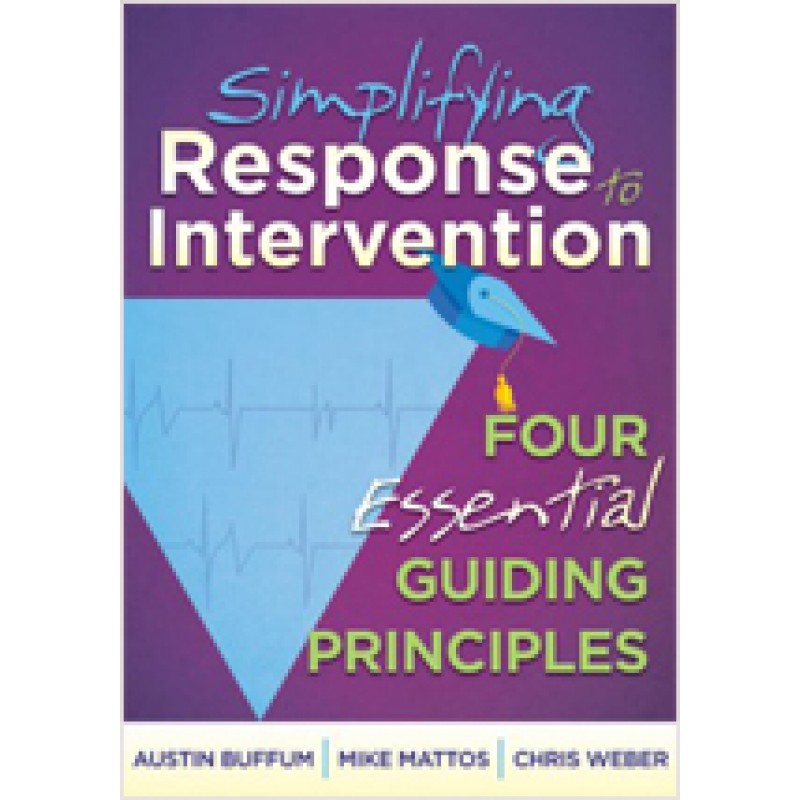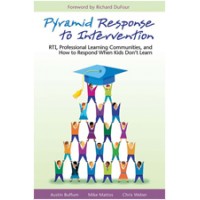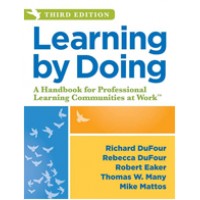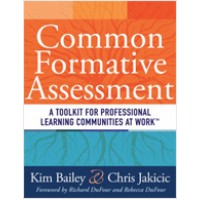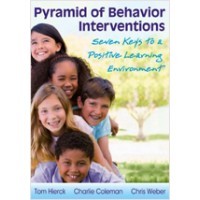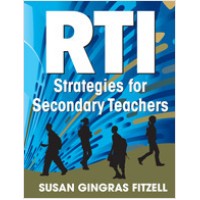Simplifying Response to Intervention: Four Essential Guiding Principles, Oct/2011
| Author(s) | Austin Buffum, Mike Mattos, Chris Weber |
| ISBN10 | 1935543652 |
| ISBN13 | 9781935543657 |
| Format | Paperback |
| Pages | 232 |
| Year Publish | 2011 October |
Synopsis
Change how you think about RTI, and learn how to create an effective model that begins with quality instruction in every classroom.
The sequel to Pyramid Response to Intervention advocates that a successful RTI model begins by asking the right questions to create a fundamentally effective learning environment for every student. RTI is not a series of implementation steps, but rather a way of thinking. Understand why bureaucratic, paperwork-heavy, compliance-oriented, test-score-driven approaches fail. Then learn how to create a focused RTI model that works.
- Use the four guiding principles to guide thinking and implementation.
- Shift to a culture of collective responsibility, and build team structures for collaboration.
- Define essential learnings in a program of concentrated instruction.
- Develop a system of convergent assessment to identify students for intervention, determine their unique needs, monitor their progress, and revise or extend learning based on their progress.
About The Authors:
Austin Buffum, EdD, has 38 years of experience in public schools. His many roles include serving as former senior deputy superintendent of the Capistrano Unified School District in California. Dr. Buffum has presented in over 400 school districts throughout the country and around the world. He delivers trainings and presentations on Pyramid Response to Intervention. This tiered approach to RTI is centered on Professional Learning Communities at Work™ concepts and strategies to ensure every student receives the time and support necessary to succeed. Dr. Buffum also delivers workshops and presentations that provide the tools educators need to build and sustain PLCs.
Dr. Buffum was selected 2006 Curriculum and Instruction Administrator of the Year by the Association of California School Administrators. He attended the Principals’ Center at the Harvard Graduate School of Education and was greatly inspired by its founder, Roland Barth, an early advocate of the collaborative culture that defines PLCs today. Dr. Buffum later led Capistrano’s K–12 instructional program on an increasingly collaborative path toward operating as a PLC. During this process, 37 of the district’s schools were designated California Distinguished Schools and 11 received National Blue Ribbon recognition.
Dr. Buffum is coauthor of Generations at School.
A graduate of the University of Southern California, Dr. Buffum earned a bachelor of music and received a master of education with honors. He also holds a doctor of education from Nova Southeastern University.
Mike Mattos, an author and a consultant, is recognized throughout North America for his work in the areas of response to intervention and professional learning communities. He is former principal of both Marjorie Veeh Elementary School and Pioneer Middle School in Tustin, California. At these schools, Mike used RTI and PLC practices to create a collaborative environment among his staff and improve learning for all students.
In 2004, Marjorie Veeh Elementary, a school with a large population of youth at risk, won the California Distinguished School and Title I Achieving School awards. A National Blue Ribbon School, Pioneer is one of only 13 schools in the nation selected by the GE Foundation as a “Best-Practice Partner” and is one of eight schools chosen by Dr. Richard DuFour to be featured in the video The Power of Professional Learning Communities at Work ™: Bringing the Big Ideas to Life. Based on standardized test scores, Pioneer ranks among the top 1 percent of California middle schools and in 2009 was named Orange County’s top middle school. For his leadership, Mike was named the Orange County Middle School Administrator of the Year by the Association of California School Administrators.
Chris Weber, EdD, is a consultant and administrative coach for Chicago Public Schools and the Oakland (California) Unified School District. He delivers trainings and presentations on Pyramid Response to Intervention. This tiered approach to RTI is centered on Professional Learning Community at Work™ concepts and strategies to ensure every student receives the time and support necessary to succeed. Dr. Weber also delivers workshops and presentations that provide the tools educators need to build and sustain PLCs.
As principal of R.H. Dana Elementary School in the Capistrano Unified School District (CUSD) in California, Dr. Weber was the leader of a highly effective professional learning community. Together with his staff, he lifted the school to remarkable levels of success. Designated Schoolwide Title I, with over 60 percent of all students English learners and Latino and over 75 percent socioeconomically disadvantaged, R.H. Dana consistently exceeded adequate yearly progress (AYP) goals. The school’s gains over four years were among the top 1 percent in the state, and it was the first school in the decades-long history of the CUSD to win the State of California’s Title I Academic Achievement Award. Under Dr. Weber’s leadership, R.H. Dana earned the first California Distinguished School Award in the school’s 42-year history. After the percentage of students meeting AYP in English and math tripled in four years, the school was named a National Blue Ribbon School. Dr. Weber credits these achievements to the daily practice of key principles: focusing on student engagement, maximizing instructional time, reallocating resources, and developing systematic student support programs based on RTI.
Dr. Weber has taught grades K–12 and served as a site administrator for elementary and secondary schools. He was director of instruction for the Garden Grove Unified School District in California, which was the 2004 winner of the prestigious Broad Prize for Urban Education. During this time, all groups of students in the district’s 47 K–6 schools achieved double-digit AYP gains in mathematics and English language arts.
He earned a master’s degree from California State University, San Marcos, and a doctorate of education from the University of California (Irvine and Los Angeles). He is a graduate of the United States Air Force Academy and a former US Air Force pilot.

